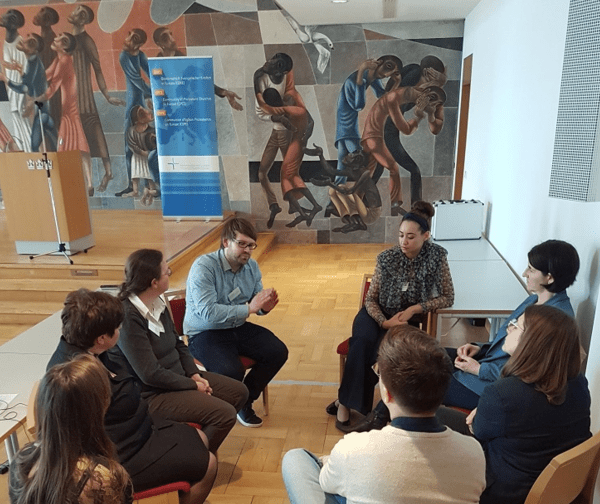Kaum ein sozialethischer Themenbereich hat innerhalb der ökumenischen Welt so viel spaltende Sprengkraft wie die Fragen zu Gender und Sexualität. Auch deswegen hat die Vollversammlung der GEKE 2018 in Basel einen Studienprozess zu diesem Thema angeregt. Wenigstens unter evangelischen Kirchen in Europa könnte es doch leichter sein, mit dem Thema umzugehen. In einem Studienprozess sollten theologische Aussagen zu Gender, Sexualität, Ehe und Familie getroffen werden und das Bild vom protestantischen Korridor, wie es in früheren ethischen Orientierungshilfen der GEKE eingeführt wurde, weiterzuentwickeln.
Eine Studiengruppe unter der Leitung von Ulla Schmidt, Mitglied im Rat der GEKE und Professorin für evangelische Theologie in Aarhus, hat dazu ein Studiendokument erarbeitet, das nicht nur vielfältige protestantische Antworten zu den gegebenen Fragen präsentieren, sondern auch grundlegende Konzepte und Theorien vorstellen und theologisch diskutieren möchte. Entstanden ist ein umfangreicher Text, der zur Anhörung im Herbst 2022 an die Mitgliedskirchen der GEKE versandt wurde.
Von 23. bis 25. Februar 2023 kamen dann in Dresden über 40 kirchliche Vertreter*innen zusammen, um den Entwurf des Studientextes zu diskutieren. Dies geschah vor allem in verschiedenen Arbeitsgruppen, in welchen die einzelnen Teile des Textes kritisch besprochen und Anmerkungen gesammelt wurden. Neben den Themenbereichen Gender, Sexualität, Ehe und Familie, denen der Text je ein eigenes Kapitel widmet, war auch Kirche, Sexualität und Gewalt ein Thema sowie die Frage nach dem konstruktiven Umgang mit ethischen Meinungsverschiedenheiten in und zwischen Kirchen.
Bei der Konsultation wurde schmerzlich deutlich, dass die Meinungsverschiedenheiten auch zwischen evangelischen Kirchen in Europa enorm sind, insbesondere bei der Frage von Seelsorge für LGBT+ Menschen. Viele Beteiligte formulierten Anfragen an das Konzept des protestantischen Korridors: Welches sind denn die Wände oder roten Linien des Korridors? Kann man mit dem Konzept noch arbeiten, wenn einzelne Positionen nicht nur verschieden, sondern punktuell sogar gegensätzlich sind?
Dennoch: das Studiendokument wird bereits jetzt für seine sensible Sprache und klare Haltung gegen Diskriminierung gelobt und mit Spannung wird die Endfassung erwartet.
Nach einer weiteren Phase der Überarbeitung im Lichte der Konsultation könnte der Rat der GEKE das Dokument noch im Herbst dieses Jahres zur Publikation freigeben. GEKE-Generalsekretär Mario Fischer, der die Moderation der Konsultation übernommen hatte, erinnerte schon zu Beginn daran, dass es sich um ein Studiendokument handelt, das also nicht einen Standpunkt der evangelischen Kirchen in Europa präsentiert oder gar verbindlich festschreibt; vielmehr soll das Dokument vor allem die Gespräche in den Mitgliedskirchen der GEKE zu den angesprochenen Themen unterstützen.
Die Zukunft der Kirchengemeinschaft wird also auch nicht von diesem Dokument bzw. den ethischen Positionen zu den angesprochenen Themen abhängen. Diese Hoffnung kam auch zum Abschluss der Dresdner Konsultation zum Ausdruck, als die Delegierten trotz aller Meinungsverschiedenheiten gemeinsam das Abendmahl feierten.
**************
Hardly any social-ethical topic area has as much divisive explosive power within the ecumenical world as the questions of gender and sexuality. This is one of the reasons why the CPCE General Assembly 2018 in Basel suggested a study process on this topic. At least among Protestant churches in Europe it could be easier to deal with the topic. In a study process theological statements on gender, sexuality, marriage and family should be made and the image of the Protestant corridor, as introduced in earlier ethical guides of the CPCE, should be further developed.
A study group under the leadership of Ulla Schmidt, member of the CPCE Council and professor of Protestant theology in Aarhus, has prepared a study document for this purpose, which not only wants to present diverse Protestant answers to the given questions, but also to present basic concepts and theories and discuss them theologically. The result is a comprehensive text which was sent to the CPCE member churches for consultation in autumn 2022.
From 23 to 25 February 2023 more than 40 church representatives met in Dresden to discuss the draft of the study text. This took place mainly in various working groups, in which the individual parts of the text were critically discussed and comments collected. In addition to the topics of gender, sexuality, marriage and family, to each of which the text devotes a separate chapter, church, sexuality and violence was also a topic, as well as the question of how to deal constructively with ethical disagreements in and between churches.
It became painfully clear during the consultation that the differences of opinion are also enormous between Protestant churches in Europe, especially on the question of pastoral care for LGBT+ people. Many participants formulated questions about the concept of the Protestant corridor: What are the walls or red lines of the corridor? Is it still possible to work with the concept when individual positions are not only different but even contradictory at points?
Nevertheless: the study document is already being praised for its sensitive language and clear stance against discrimination, and the final version is eagerly awaited.
After a further phase of revision in the light of the consultation, the CPCE Council could release the document for publication this autumn. CPCE General Secretary Mario Fischer, who had taken over the moderation of the consultation, reminded right at the beginning that this is a study document, i.e. it does not present a position of the Protestant churches in Europe or even lay down a binding position; rather the document is above all intended to support the discussions in the CPCE member churches on the issues addressed.
The future of the church communion will therefore not depend on this document or the ethical positions on the issues addressed. This hope was also expressed at the end of the Dresden consultation when the delegates celebrated the Lord’s Supper together despite all differences of opinion.
